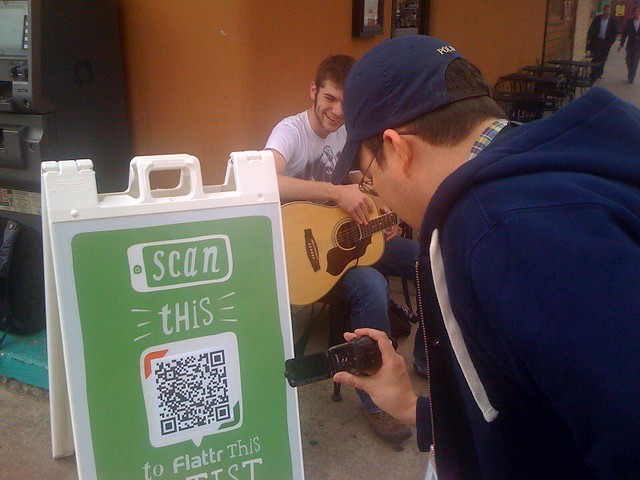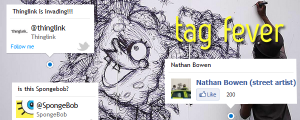Last January we found out the Swedish team behind Flattr were organising their first meetup in central London. As platform users & heavy backers of their universal micro-payment system we thought there was no better thing to do that Wednesday evening than listening to what Linus, Peter, Joel & Pelle had to say about their 1 year old child.
Along with the ex-idealists there was Eileen Burbidge, co-founder of White Bear Yard (their angel investors) who besides giving a few figures and hosting the evening, also tried to throw some light on the strategy & future of something as unfinished but also as attractive as a year old product.

Payment or not payment intended the micro-funding ecosystem is exploding, maybe finally coming together, so we went there hoping to understand the particularities of Flattr as a service and the obstacles that keep this micro-payment system from reaching true global success.
The idea of a group of people uniting small amounts of $$ to make a project happen or keep it going is certainly not new, but with each twist of the “donate/pay as you go” trend for on-line content the dream of having a credible digital business model for creators, distributors and users is somehow materializing.
This micro-donation ecosystem which includes dozens of iterations got popular in the 90s, never took off, but the use of mass media publishers & the need to find alternative revenue streams are propagating the appearance of these platforms. Many of which focus around the artist and publisher figures . From the crowdfunding players which offer a bonus to the donors via a centralized site (think of Kickstarter), to the less visible but probably more useful micro-donation services.
If we focus our attention on the latter, a new trend of decentralized platforms are leading the way towards a win-win content owner & user relationship. These allow any registered user reward / donate / “pay” any publisher for small parts of their product/service rather than having to subscribe to it.
Payment or donation the number of tools on the web may currently be too large… Mobimoneybox, Kachingle, Sprinklepenny (which we can assume is dead), Flattr…. and then we have many other variations & niche platforms (some of them with exactly the opposite strategy) trying to mediate between content owner & final user.
(Peter is week after week giving a talk and using his image to promote the service, he’s got a tough mission: keep spreading the “justice & egalitarian” discourse while making it attractive for big publishers)
At that time, when listening to Linus, Peter & Eileen, there didn’t seem to be a consistent speech with the strategy & future evolution of their product. We had on one side the “idealist” who kept repeating “you have to be ready to give in order to get” ad nauseam, then the instrumentalist proclaiming himself being a “socialist” and finally the perfectionist governess trying to give a solid image of a capable but not mature enough product at that time.
Flattr initially had the ambition to reach 1M users by the end of this year, ideally 5M (Peter’s wild dreams), a figure they consider to be critical to make the revenue drip appealing to the biggest publishers who will then, hopefully, reel in more subscribers. 3 months ago they service had over 50K active users (100K users) and 70% were purely donors.
<br />
Peter gives a rather less enthusiastic but more credible speech @ this year’s re:publica’s (2nd interview, always very instructive, full re:publica speech here)
Such percentage reaffirmed their idealist moto “people are willing to pay” as most of their user-base, including us, give away a few €€ each month to those sites & projects we like (well, more like ONGs because we haven’t found many sites we truly like using their button). The underlying problem is that the amount of publishers using flattr is very small. They know there’s a market gap they “want to glue”, but haven’t managed to attract big publishers outside Germany for now (about half of the content on Flattr is Deutsche).
Maybe it’s a geo-cultural perspective, the “European” way of conceiving a solution for financing cultural content, maybe the U.S. on-line media firms don’t conceive flattr as a serious “complement” (“making a few cents” is not a very convincing argument) while they keep eternally discussing how to survive on-line without adding ridiculous walls to their content.
And to make Flattr especially more appealing to the American public the Swedish team announced 3 days ago via e-mail & a blog post that from today onwards anyone will be able to receive flattrs, even accounts without means. This is a decisive move if they want to be successful outside countries with a traditional “socialist” cut (Germany, Sweden…). And they know that the only way to reach any kind of web awareness is by convincing American publishers.
killing an ideal
Basically the team have sacrificed their most basic principle for the sake of survival. Becoming not only the preferred micropayment tool on the market but a credible alternative to web advertising seems to be their new goal. Whether one day they’ll reach Paypal’s more than 85 million active users is another story.

Besides this moral loss it seems the decision has has generated some contradictory feelings… well received by content publishers who’ll be able to add an extra tiny revenue source but not that well accepted by many of their current users… the Platonists.
Even if Sunde thinks that big publishers, distributors etc shouldn’t really use crowdfunding instruments as a way to raise €€ for their popcorn & soda products, if Flattr is really willing to get some of those big names on board (and we’re not considering flattr as a crowdfunding tool but it does inevitably fall into this category too) they should start forgetting the whole “on-line fair trade” speech. Or can this Swedish team find some sort of balance between web capitalism and web socialism?
Maybe now that one of the last remaining original Flattr ideals has been extirpated, all those “money-driven” websites will begin to adopt the service leaving the “donate” concept aside to become more & more a proper payment system. Although we should carefully pay much more attention to the rest of things to come from Malmö… like a twitter integration for the sign-up process, browser plug-ins, … a big list of evolutions that will attempt to make of Flattr a new standard.
The only thing they’ve got left is to convince Mr Murdoch to add some flattr love to his on-line empire before he retires (if ever). We look forward to it.

















